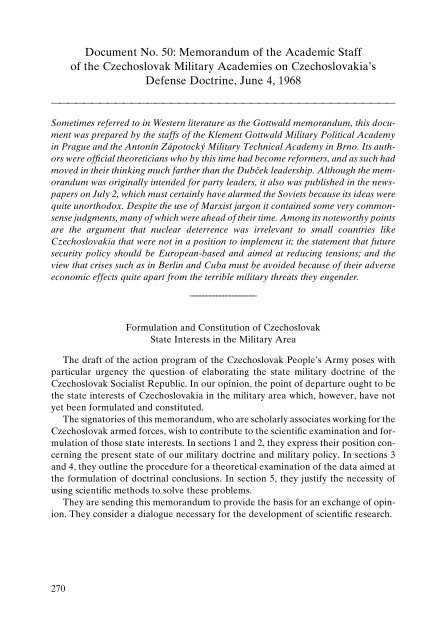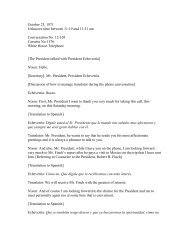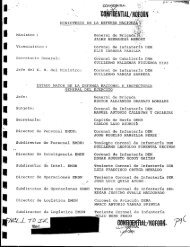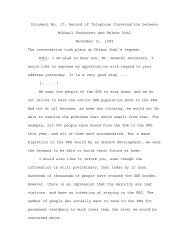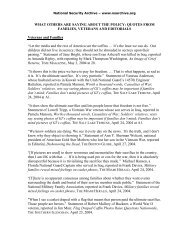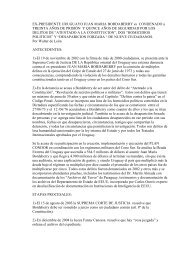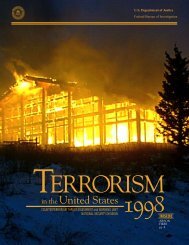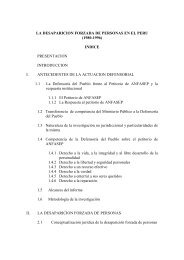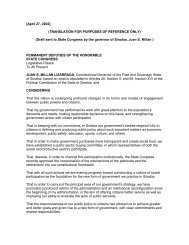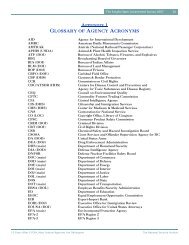Document No. 50: Memorandum of the Academic Staff of the ...
Document No. 50: Memorandum of the Academic Staff of the ...
Document No. 50: Memorandum of the Academic Staff of the ...
- No tags were found...
You also want an ePaper? Increase the reach of your titles
YUMPU automatically turns print PDFs into web optimized ePapers that Google loves.
Mastny-Byrne 2005/04/27 13:12 Page 270<strong>Document</strong> <strong>No</strong>. <strong>50</strong>: <strong>Memorandum</strong> <strong>of</strong> <strong>the</strong> <strong>Academic</strong> <strong>Staff</strong><strong>of</strong> <strong>the</strong> Czechoslovak Military Academies on Czechoslovakia’sDefense Doctrine, June 4, 1968———————————————————————————————————————————Sometimes referred to in Western literature as <strong>the</strong> Gottwald memorandum, this documentwas prepared by <strong>the</strong> staffs <strong>of</strong> <strong>the</strong> Klement Gottwald Military Political Academyin Prague and <strong>the</strong> Antonín Zápotocký Military Technical Academy in Brno. Its authorswere <strong>of</strong>ficial <strong>the</strong>oreticians who by this time had become reformers, and as such hadmoved in <strong>the</strong>ir thinking much far<strong>the</strong>r than <strong>the</strong> Dubček leadership. Although <strong>the</strong> memorandumwas originally intended for party leaders, it also was published in <strong>the</strong> newspaperson July 2, which must certainly have alarmed <strong>the</strong> Soviets because its ideas werequite unorthodox. Despite <strong>the</strong> use <strong>of</strong> Marxist jargon it contained some very commonsensejudgments, many <strong>of</strong> which were ahead <strong>of</strong> <strong>the</strong>ir time. Among its noteworthy pointsare <strong>the</strong> argument that nuclear deterrence was irrelevant to small countries likeCzechoslovakia that were not in a position to implement it; <strong>the</strong> statement that futuresecurity policy should be European-based and aimed at reducing tensions; and <strong>the</strong>view that crises such as in Berlin and Cuba must be avoided because <strong>of</strong> <strong>the</strong>ir adverseeconomic effects quite apart from <strong>the</strong> terrible military threats <strong>the</strong>y engender.____________________Formulation and Constitution <strong>of</strong> CzechoslovakState Interests in <strong>the</strong> Military AreaThe draft <strong>of</strong> <strong>the</strong> action program <strong>of</strong> <strong>the</strong> Czechoslovak People’s Army poses withparticular urgency <strong>the</strong> question <strong>of</strong> elaborating <strong>the</strong> state military doctrine <strong>of</strong> <strong>the</strong>Czechoslovak Socialist Republic. In our opinion, <strong>the</strong> point <strong>of</strong> departure ought to be<strong>the</strong> state interests <strong>of</strong> Czechoslovakia in <strong>the</strong> military area which, however, have notyet been formulated and constituted.The signatories <strong>of</strong> this memorandum, who are scholarly associates working for <strong>the</strong>Czechoslovak armed forces, wish to contribute to <strong>the</strong> scientific examination and formulation<strong>of</strong> those state interests. In sections 1 and 2, <strong>the</strong>y express <strong>the</strong>ir position concerning<strong>the</strong> present state <strong>of</strong> our military doctrine and military policy. In sections 3and 4, <strong>the</strong>y outline <strong>the</strong> procedure for a <strong>the</strong>oretical examination <strong>of</strong> <strong>the</strong> data aimed at<strong>the</strong> formulation <strong>of</strong> doctrinal conclusions. In section 5, <strong>the</strong>y justify <strong>the</strong> necessity <strong>of</strong>using scientific methods to solve <strong>the</strong>se problems.They are sending this memorandum to provide <strong>the</strong> basis for an exchange <strong>of</strong> opinion.They consider a dialogue necessary for <strong>the</strong> development <strong>of</strong> scientific research.270
Mastny-Byrne 2005/04/27 13:12 Page 271Prague, May 19681. Political and Military Doctrine1.1. The political doctrine <strong>of</strong> a socialist state is primarily influenced by <strong>the</strong> choice<strong>of</strong> wider goals within <strong>the</strong> international community and its relationship with <strong>the</strong> diverseforces representative <strong>of</strong> social progress.The principle <strong>of</strong> socialist internationalism is organically linked with <strong>the</strong> nationalresponsibility <strong>of</strong> a sovereign state. This is normally more important as well as moredifficult <strong>the</strong> smaller <strong>the</strong> physical power <strong>of</strong> <strong>the</strong> state. The choice cannot solely dependon “national interest,” which cannot be defined in a pure form—nei<strong>the</strong>r as an interest<strong>of</strong> one’s own state, nor as an interest <strong>of</strong> <strong>the</strong> leading state <strong>of</strong> a coalition. The interest<strong>of</strong> <strong>the</strong> societal movement, <strong>of</strong> which sovereign states are a part, is decisive, specifically<strong>the</strong> interest <strong>of</strong> European socialism and its dynamic development. Mere defense <strong>of</strong>what has been accomplished fosters stagnation and degeneration; <strong>the</strong> wrong choice<strong>of</strong> an <strong>of</strong>fensive strategy has a destructive effect on <strong>the</strong> progress <strong>of</strong> <strong>the</strong> whole societalmovement.1.2. Military policy as an aggregate <strong>of</strong> actions in military matters implements militaryinterests and needs through a chosen strategy. In regard to national interest,<strong>the</strong> military doctrine <strong>of</strong> <strong>the</strong> state can be described as a comprehensive formulation<strong>of</strong> its military interests and needs.The doctrine is a binding <strong>the</strong>oretical and ideological base for <strong>the</strong> formulation <strong>of</strong>military policy and <strong>the</strong> resulting measures as well as for negotiations with <strong>the</strong> alliancepartners. It amounts to a compromise between <strong>the</strong> maximum requirements and actualresources, between <strong>the</strong> dynamics <strong>of</strong> <strong>the</strong> evolving military knowledge and <strong>the</strong> findings<strong>of</strong> <strong>the</strong> social sciences, between <strong>the</strong> development <strong>of</strong> technology and <strong>the</strong> requirement<strong>of</strong> an effective defense system corresponding to <strong>the</strong> military circumstances at anygiven time.1.3. The formulation <strong>of</strong> <strong>the</strong> state’s military doctrine influences retroactively its politicaldoctrine and strategy. It substantially affects its capability to project itself internationallyby nonmilitary means. Giving up one’s own military doctrine means givingup responsibility for one’s own national and international action. A surrender to spontaneity,this entails <strong>the</strong> de-politicization <strong>of</strong> military thought, which in turn leads to aparalysis <strong>of</strong> <strong>the</strong> army. It is <strong>the</strong> fundamental source <strong>of</strong> crisis <strong>of</strong> <strong>the</strong> army organism bytearing it out <strong>of</strong> society. It disrupts <strong>the</strong> metabolism between <strong>the</strong> army and <strong>the</strong> society.It deprives <strong>the</strong> army <strong>of</strong> its raison d’être for <strong>the</strong> national community by limiting <strong>the</strong>interaction between national goals and <strong>the</strong> goals <strong>of</strong> <strong>the</strong> socialist community.2. The Past, Present, and Future <strong>of</strong> Czechoslovakia’s Military Policy2.1. The foundations <strong>of</strong> Czechoslovakia’s present defense systems were laid at <strong>the</strong>beginning <strong>of</strong> <strong>the</strong> 19<strong>50</strong>s, at which time <strong>the</strong> responsible political actors <strong>of</strong> <strong>the</strong> socialistcountries assumed that a military conflict in Europe was imminent. It was a strategybased on <strong>the</strong> slogan <strong>of</strong> defense against imperialist aggression, but at <strong>the</strong> same timeassuming <strong>the</strong> possibility <strong>of</strong> transition to <strong>the</strong> strategic <strong>of</strong>fensive with <strong>the</strong> goal <strong>of</strong> achievingcomplete Soviet hegemony in Europe. <strong>No</strong> explicit reassessment <strong>of</strong> this coalitionstrategy, by taking into account <strong>the</strong> potential <strong>of</strong> nuclear missiles, has ever taken place.271
Mastny-Byrne 2005/04/27 13:12 Page 2722.2. The Czechoslovak army, created with great urgency and extraordinary exertion,became a substantial strategic force by <strong>the</strong> time Europe’s political and militarysituation had fundamentally changed. Although in 1953 we noted a relaxation <strong>of</strong>international tension and in 1956 introduced <strong>the</strong> new strategy <strong>of</strong> peaceful coexistence,no formulation <strong>of</strong> Czechoslovakia’s own military doctrine or reform <strong>of</strong> its armytook place. Invoking <strong>the</strong> threat <strong>of</strong> German aggression, <strong>the</strong> alliance continued to betightened up. Increasingly, <strong>the</strong> threat <strong>of</strong> German aggression has taken on <strong>the</strong> role <strong>of</strong>an extraneous factor employed with <strong>the</strong> intent to streng<strong>the</strong>n <strong>the</strong> cohesion <strong>of</strong> <strong>the</strong>socialist community. Once <strong>the</strong> original notions about <strong>the</strong> applicability <strong>of</strong> a universaleconomic and political model had to be revised, military cooperation was supposedto compensate for insufficient economic cooperation and <strong>the</strong> inadequacy <strong>of</strong> o<strong>the</strong>rrelationships among <strong>the</strong> socialist countries.2.3. In politics, <strong>the</strong>re is a lack <strong>of</strong> clarity about <strong>the</strong> probable trends <strong>of</strong> developmentin <strong>the</strong> progressive movement to which we belong. There is a prevailing tendency tocling to <strong>the</strong> obsolete notions that have become part <strong>of</strong> <strong>the</strong> ideological legacy <strong>of</strong> <strong>the</strong>socialist countries. There is a prevailing tendency to try to influence all <strong>the</strong> segments<strong>of</strong> <strong>the</strong> movement, regardless <strong>of</strong> <strong>the</strong> sharply growing differences in <strong>the</strong>ir respectiveneeds resulting from social and economic development.In 1956 and 1961, we proved by our deeds that we were ready to bear any globalrisks without claiming a share <strong>of</strong> responsibility for <strong>the</strong> political decisions and <strong>the</strong>irimplementation. By doing so, we proved that we did not understand even <strong>the</strong> Europeansituation and were guided not by sober analysis but by political and ideological stereotypes.(Hence also <strong>the</strong> surprise with regard to Hungary in 1956 and <strong>the</strong> inadequateresponse in 1961.)2.4. Our military policy did not rest on an analysis <strong>of</strong> our own national needs andinterests. It did not rest on our own military doctrine. Instead it was a reflection <strong>of</strong><strong>the</strong> former sectarian party leadership, which prevented <strong>the</strong> party from conducting arealistic policy <strong>of</strong> harmonizing <strong>the</strong> interests <strong>of</strong> different groups with national andinternational interests for <strong>the</strong> benefit <strong>of</strong> socialism. The development <strong>of</strong> <strong>the</strong> army wasdeprived <strong>of</strong> both rational criteria and an institutionalized opposition. Military policywas reduced to <strong>the</strong> quest to optimally match our resources with <strong>the</strong> demands <strong>of</strong><strong>the</strong> alliance. Devoid <strong>of</strong> principles, it was bound to create contradictions and criseswithin <strong>the</strong> army.Inevitably <strong>the</strong> twenty years <strong>of</strong> deformed development affected <strong>the</strong> ability, or ra<strong>the</strong>rinability, <strong>of</strong> <strong>the</strong> cadres to overcome <strong>the</strong> deformations. Theoretical backwardness inmilitary <strong>the</strong>ory and <strong>the</strong> formulation <strong>of</strong> a military doctrine has been a great obstacleto <strong>the</strong> overcoming <strong>of</strong> past errors.2.5. Czechoslovakia’s military policy will continue being built upon <strong>the</strong> alliancewith o<strong>the</strong>r Warsaw Treaty partners, above all <strong>the</strong> USSR. At <strong>the</strong> same time, however,it will be a policy based on state sovereignty, and designed to provide our inputinto developing <strong>the</strong> alliance’s common positions. A modern conception <strong>of</strong> <strong>the</strong> WarsawTreaty can only have one meaning: <strong>the</strong> increased external security <strong>of</strong> its memberstatesto foster <strong>the</strong> development <strong>of</strong> both <strong>the</strong> socialist states and <strong>the</strong> states <strong>of</strong> WesternEurope. Our military policy will not shun global risks, but only in <strong>the</strong> role <strong>of</strong> a partnerra<strong>the</strong>r than <strong>of</strong> a victim <strong>of</strong> a development that it cannot influence.272
Mastny-Byrne 2005/04/27 13:12 Page 273It will essentially be a European security policy, supportive <strong>of</strong> international détentein Europe, all-European cooperation, and Europe’s progressive forces. It will serveas an instrument <strong>of</strong> a broader, but not self-serving policy. A military policy that needsto construe and exaggerate an enemy threat fosters conservative tendencies in bothsocialism and capitalism. While in <strong>the</strong> short run it may seem to “streng<strong>the</strong>n” socialism,in <strong>the</strong> long run it weakens it.2.6. Czechoslovakia’s military policy must rest on a scientific analysis <strong>of</strong> a wholerange <strong>of</strong> possible war situations in Europe, formulate its own sovereign interests andneeds accordingly, estimate its military capabilities in particular situations within <strong>the</strong>framework <strong>of</strong> <strong>the</strong> coalition, and act on its own scientifically elaborated strategic doctrine.3. The Contemporary War–Peace Situation3.1. The naively pragmatic realist approach considers relations among sovereignstates from <strong>the</strong> point <strong>of</strong> view <strong>of</strong> ei<strong>the</strong>r war or peace. In actuality <strong>the</strong>re is a wholerange <strong>of</strong> situations whose common denominator is <strong>the</strong> availability <strong>of</strong> instruments <strong>of</strong>armed violence but which differ in <strong>the</strong> manner <strong>of</strong> <strong>the</strong>ir use. As a result <strong>of</strong> substantivesocial and political changes and <strong>the</strong> scientific–technological revolution in militaryaffairs, such a range <strong>of</strong> situations is considerably more complex and diverse notonly in comparison with <strong>the</strong> situation before World War II but also with <strong>the</strong> situationin <strong>the</strong> early fifties.Yet, at this very time <strong>of</strong> incipient gigantic transformations <strong>of</strong> a social and politicalas well as scientific and technological nature, our military policy and doctrineapplied <strong>the</strong> Soviet model as universally valid.3.2. The above-mentioned range <strong>of</strong> possible situations may be summarized as follows:– absolute war (in different variations),– limited wars (<strong>of</strong> several types),– a situation between war and peace resulting from <strong>the</strong> long-term legalization <strong>of</strong>an originally temporary armistice as a result <strong>of</strong> which <strong>the</strong> adversaries are nolonger fighting but peace treaties have not been concluded ei<strong>the</strong>r,– potential war, i.e. indirect use <strong>of</strong> instruments <strong>of</strong> armed violence as a means <strong>of</strong>foreign policy,– peace among potential adversaries,– peace among allied sovereign states,– peace among neutrals,– absolute peace through general and complete disarmament.This description is a distillation <strong>of</strong> specific situations, which are in turn combinations<strong>of</strong> an indefinite number <strong>of</strong> possible situations that make sovereign states andmilitary coalitions implement <strong>the</strong>ir foreign and military policies.3.3. The stereotype <strong>of</strong> class struggle, with its dichotomy <strong>of</strong> friends and foes, hasreduced substantive political distinctions among sovereign states to basic class antagonism,with pernicious consequences for our political strategy and tactics. Yet <strong>the</strong>Leninist postulate <strong>of</strong> specific analysis <strong>of</strong> a concrete situation differentiates accordingto actual distinctions.273
Mastny-Byrne 2005/04/27 13:12 Page 274At <strong>the</strong> very least, <strong>the</strong> typology should consider:– actual and potential allies,– neutrals,– potential adversaries,– actual adversaries,– war enemies.Czechoslovakia’s state interests and needs require doing justice to different situationalvariants while rejecting illusions and dangerous simplifications.4. Possible Formulation <strong>of</strong> Czechoslovakia’s Military Interests and Needs Relatedto <strong>the</strong> War–Peace Situation in Contemporary EuropeThe doctrinal formulation and constitution <strong>of</strong> Czechoslovak military interests andneeds first requires a substantive analysis <strong>of</strong> particular war–peace situations, especiallyin Europe. Our own military interests and needs should <strong>the</strong>n be formulatedaccordingly. This should be <strong>the</strong> point <strong>of</strong> departure for practical measures in accordancewith <strong>the</strong> doctrine. Following is a brief outline <strong>of</strong> how one might proceed insome <strong>of</strong> <strong>the</strong> basic situations.4.1. Absolute war in EuropeGiven <strong>the</strong> accumulation <strong>of</strong> nuclear missiles by both major military coalitions, <strong>the</strong>possible outbreak <strong>of</strong> such a war in Europe is fraught with catastrophic consequencesfor most <strong>of</strong> its European participants. At <strong>the</strong> same time, <strong>the</strong> permanent lead time in<strong>the</strong> <strong>of</strong>fensive ra<strong>the</strong>r than <strong>the</strong> defensive deployment <strong>of</strong> nuclear missiles, as well as ourunfavorable geographical position, make it impossible to substantially limit <strong>the</strong> destructiveness<strong>of</strong> enemy first strikes against our territory to an extent compatible with <strong>the</strong>preservation <strong>of</strong> our national and state existence. It must be said openly that <strong>the</strong> outbreakand conduct <strong>of</strong> a global nuclear war in <strong>the</strong> European <strong>the</strong>ater would be tantamountto national extinction and <strong>the</strong> demise <strong>of</strong> state sovereignty, especially <strong>of</strong> <strong>the</strong>frontline states, including Czechoslovakia. The futility <strong>of</strong> such a war as a means <strong>of</strong>settling European disputes, as demonstrated by <strong>the</strong> development <strong>of</strong> <strong>the</strong> so-calledBerlin crisis <strong>of</strong> 1961, <strong>of</strong> course does not exclude its possibility.In such a situation, we consider it appropriate to formulate Czechoslovakia’s militaryinterests and needs as a matter <strong>of</strong> primary existential importance:– preventing <strong>the</strong> conduct <strong>of</strong> a nuclear war on our territory is a fundamental existentialneed <strong>of</strong> our society;– Czechoslovakia has a strategic interest in actively contributing to <strong>the</strong> reduction<strong>of</strong> <strong>the</strong> real possibility <strong>of</strong> absolute war in Europe.Our fundamental needs and interests in <strong>the</strong> event <strong>of</strong> such a war should determinea foreign policy aimed at limiting <strong>the</strong> possibility <strong>of</strong> a nuclear attack against Czechoslovakia.The appropriate measures are, for example, <strong>the</strong> conclusion <strong>of</strong> a nuclearnon-proliferation treaty, <strong>the</strong> creation <strong>of</strong> a nuclear-free zone in Central Europe, andsupplementary guarantees <strong>of</strong> <strong>the</strong> status quo in Europe.4.2. Limited war in EuropeAnalysis <strong>of</strong> <strong>the</strong> possible scenarios in Europe obviously starts with recognition <strong>of</strong><strong>the</strong> growing danger <strong>of</strong> such a war and its growing strategic and political significance.In recognizing <strong>the</strong> futility <strong>of</strong> limited war as a means <strong>of</strong> Czechoslovak foreign pol-274
Mastny-Byrne 2005/04/27 13:12 Page 275icy and in emphasizing our interest in eliminating it as a means <strong>of</strong> settlement <strong>of</strong>European disputes, we assume <strong>the</strong> necessity <strong>of</strong> purposefully waging war against anattack in a fashion conducive to limiting its destructive effects on our territory andpopulation.The formulation and constitution <strong>of</strong> Czechoslovakia’s particular interests andneeds will determine <strong>the</strong> practical measures to be taken:– Preparation <strong>of</strong> Czechoslovakia’s armed forces and its entire defense systemwithin <strong>the</strong> framework <strong>of</strong> <strong>the</strong> Warsaw Treaty for <strong>the</strong> different variants <strong>of</strong> enemyattack with <strong>the</strong> goal <strong>of</strong> repelling it, defeating <strong>the</strong> adversary, and compelling himto settle peacefully.– Reduction <strong>of</strong> <strong>the</strong> real possibility <strong>of</strong> war by reciprocal military and political acts<strong>of</strong> peaceful coexistence aimed at eliminating <strong>the</strong> use <strong>of</strong> force as a means <strong>of</strong> <strong>the</strong>settlement <strong>of</strong> disputes.4.3. Situation between war and peace in EuropeThis is <strong>the</strong> situation resulting from <strong>the</strong> failure to conclude a peace treaty withGermany and from <strong>the</strong> great-power status <strong>of</strong> Berlin inside <strong>the</strong> territory <strong>of</strong> <strong>the</strong> GDR.Herein is <strong>the</strong> possibility <strong>of</strong> a sudden deterioration leading to severe military and politicalcrisis. At <strong>the</strong> present time, such a crisis would have catastrophic consequencesfor our economy, as happened during <strong>the</strong> 1961 Berlin and 1962 Cuban crises. Thiswould substantially worsen our strained economic situation, with overly negative consequencesfor our development in a progressive direction.These characteristics determine our approach to <strong>the</strong> formulation <strong>of</strong> Czechoslovakia’sinterests and needs, namely:– our primary strategic and political need to prevent such a military and politicalcrisis at <strong>the</strong> present time,– our interest in reducing <strong>the</strong> possibility <strong>of</strong> a transition from <strong>the</strong> absence <strong>of</strong> warto a limited war while searching for a solution to <strong>the</strong> German question as <strong>the</strong>key question <strong>of</strong> contemporary Europe.This fur<strong>the</strong>r postulates measures to be taken in both military and foreign policy,above all through <strong>the</strong> Warsaw Pact, with <strong>the</strong> goal <strong>of</strong> normalizing relations betweenCzechoslovakia and <strong>the</strong> Federal Republic <strong>of</strong> Germany.4.4. Potential war in EuropeAt issue is <strong>the</strong> indirect use <strong>of</strong> <strong>the</strong> potential for armed violence as an instrument<strong>of</strong> foreign policy, as implied in <strong>the</strong> policy <strong>of</strong> deterrence, practiced especially by <strong>the</strong>nuclear powers. Czechoslovakia cannot use deterrence against <strong>the</strong> Western powers.Its deterrence posture is declaratory and politically ineffective if it is not supportedby strategic measures against potential adversaries geographically distant from us.At <strong>the</strong> same time, <strong>the</strong> use <strong>of</strong> deterrence against Czechoslovakia by some <strong>of</strong> its potentialadversaries forces us to respond in kind.These characteristics determine <strong>the</strong> formulation <strong>of</strong> Czechoslovakia’s needs andinterests, namely:– our temporary need to use <strong>the</strong> potential for armed violence against <strong>the</strong> adversarythat uses it against us,– our lack <strong>of</strong> interest in using it as a matter <strong>of</strong> equivalent reciprocity, i.e. ourinterest in its exclusion as an instrument <strong>of</strong> foreign policy.275
Mastny-Byrne 2005/04/27 13:12 Page 276In this situation, we aim at <strong>the</strong> conclusion <strong>of</strong> legally binding agreements with potentialadversaries that would ban <strong>the</strong> use <strong>of</strong> <strong>the</strong> threat <strong>of</strong> force in mutual relations. Thiscan be realized in relations between Czechoslovakia and Austria, Czechoslovakia andFrance, and Czechoslovakia and <strong>the</strong> Federal Republic <strong>of</strong> Germany.4.5. Peace among potential adversaries in EuropeThis is <strong>the</strong> situation obtaining in Europe among potential adversaries who haveno mutually exclusive interests and do not apply <strong>the</strong> policy <strong>of</strong> deterrence against oneano<strong>the</strong>r.Here Czechoslovakia’s interests and needs lie in <strong>the</strong> legal codification <strong>of</strong> <strong>the</strong> state<strong>of</strong> peace with a growing number <strong>of</strong> potential adversaries.Our practical goals should be <strong>the</strong> conclusion <strong>of</strong> non-aggression treaties and armslimitation agreements with such partners. In this way, we can contribute to <strong>the</strong> reduction<strong>of</strong> tensions between potential adversaries, <strong>the</strong> growth <strong>of</strong> peace in Europe, and<strong>the</strong> reciprocal gradual neutralization <strong>of</strong> instruments <strong>of</strong> armed violence.4.6. In o<strong>the</strong>r possible peace situations in Europe, as enumerated earlier, militaryinterests and needs represent a share in Czechoslovakia’s overall interests and needs.The closer <strong>the</strong> peace, <strong>of</strong> course, <strong>the</strong> lower <strong>the</strong> share. Absolute peace entails <strong>the</strong> abolition<strong>of</strong> <strong>the</strong> material and technological base for war, and thus also <strong>of</strong> <strong>the</strong> base formilitary interests and needs.In view <strong>of</strong> Czechoslovakia’s current foreign and military policy predicament, ourmain task is <strong>the</strong> formulation and constitution <strong>of</strong> its military interests and needs pertinentto <strong>the</strong> situations referred to in points 4.2 through 4.5.If <strong>the</strong> formulation <strong>of</strong> Czechoslovak military doctrine is to be more scientific, <strong>the</strong>main question is that <strong>of</strong> choosing <strong>the</strong> right approach and avoiding <strong>the</strong> wrong ones.5. Systems Analysis and <strong>the</strong> Use <strong>of</strong> Modern Research Methods5.1. In constituting a Czechoslovak military doctrine, <strong>the</strong> most dangerous and precariousapproach is <strong>the</strong> one-sided use <strong>of</strong> simple logic and old-fashioned workinghabits.If Czechoslovakia is to be preserved as an entity, giving absolute priority to <strong>the</strong>possibility <strong>of</strong> a general war in Europe that involves <strong>the</strong> massive use <strong>of</strong> nuclear weaponsmakes no sense, for this entails a high probability <strong>of</strong> our country’s physical liquidationregardless <strong>of</strong> how much money and resources are spent on its armed forces andregardless even <strong>of</strong> <strong>the</strong> final outcome <strong>of</strong> <strong>the</strong> war.5.2. For each <strong>of</strong> <strong>the</strong> variants under 4.2, 4.3, 4.4, and 4.5, systems analysis and o<strong>the</strong>rmodern methods <strong>of</strong> research allow us to determine <strong>the</strong> correlation between, on <strong>the</strong>one hand, <strong>the</strong> material, financial, and personnel expenditures on <strong>the</strong> armed forces(assuming perfect rationality <strong>of</strong> <strong>the</strong>ir development) and, on <strong>the</strong> o<strong>the</strong>r hand, <strong>the</strong> degree<strong>of</strong> risk <strong>of</strong> <strong>the</strong> state’s physical destruction and <strong>the</strong> loss <strong>of</strong> its sovereignty, while takinginto account <strong>the</strong> chances <strong>of</strong> a fur<strong>the</strong>r advance <strong>of</strong> socialism, or even <strong>the</strong> elimination<strong>of</strong> <strong>the</strong> threat <strong>of</strong> war.At issue is <strong>the</strong> attainment <strong>of</strong> pragmatic stability in national defense and armydevelopment, corresponding to political needs and related to foreign policy by strivingto avert war through increasing <strong>the</strong> risks for <strong>the</strong> potential adversary while pre-276
Mastny-Byrne 2005/04/27 13:12 Page 277serving <strong>the</strong> sovereign existence <strong>of</strong> <strong>the</strong> Czechoslovak Socialist Republic, thus givingsubstance to its contribution to <strong>the</strong> coalition in fulfillment <strong>of</strong> its internationalist duty.Managing <strong>the</strong> development <strong>of</strong> our armed forces solely on <strong>the</strong> basis <strong>of</strong> simple logic,empiricism, and historical analogy, perhaps solely in <strong>the</strong> interests <strong>of</strong> <strong>the</strong> coalitionwithout regard to one’s own sovereign interests, is in its final effect inappropriateand contradicts <strong>the</strong> coalition’s interests.Besides <strong>the</strong> reconciliation <strong>of</strong> our own and <strong>the</strong> coalition’s interests in our militarydoctrine, we consider it necessary to utilize systems analysis and all o<strong>the</strong>r availablemethods <strong>of</strong> scientific prognosis, including model-building. Thus <strong>the</strong> preparedness <strong>of</strong>our armed forces in different variants can be assessed and related to <strong>the</strong> evolvingpolitical needs and economic possibilities. This concerns not so much tactical, operational,and organizational issues as <strong>the</strong> confrontation <strong>of</strong> political and doctrinal problemswith reality.We regard systems analysis as <strong>the</strong> new quality that can raise <strong>the</strong> effectiveness <strong>of</strong>our armed forces above <strong>the</strong> current level.5.3. At <strong>the</strong> most general level, we can see two possible ways <strong>of</strong> managing ourarmy’s development:– The first way is proceeding from <strong>the</strong> recognition <strong>of</strong> <strong>the</strong> personnel, technological,and financial limitations imposed by society upon <strong>the</strong> armed forces toward<strong>the</strong> evaluation <strong>of</strong> <strong>the</strong> risks resulting from <strong>the</strong> failure to achieve desirable politicalgoals under <strong>the</strong> different variants <strong>of</strong> European development described in<strong>the</strong> preceding section. The decision about <strong>the</strong> extent <strong>of</strong> acceptable risk mustbe made by <strong>the</strong> supreme political organ <strong>of</strong> <strong>the</strong> state.– The second way is proceeding from <strong>the</strong> recognition <strong>of</strong> <strong>the</strong> acceptable risk asset by <strong>the</strong> political leadership toward <strong>the</strong> provision <strong>of</strong> <strong>the</strong> necessary personnel,technological, and financial means corresponding to <strong>the</strong> different variants <strong>of</strong>European development.Ei<strong>the</strong>r <strong>of</strong> <strong>the</strong>se ways presupposes elaboration <strong>of</strong> less than optimal models <strong>of</strong> armydevelopment for each <strong>of</strong> <strong>the</strong> variants, applying <strong>the</strong> requirements <strong>of</strong> national defenseregardless <strong>of</strong> <strong>the</strong> existing structure <strong>of</strong> <strong>the</strong> system. Confrontation <strong>of</strong> <strong>the</strong> model with<strong>the</strong> available resources should <strong>the</strong>n determine <strong>the</strong> specific measures to be taken inmanaging <strong>the</strong> development <strong>of</strong> <strong>the</strong> armed forces and <strong>the</strong>ir components.The proposed procedure would not make sense if we were to keep <strong>the</strong> non-systemic,compartmentalized approach to building our armed forces without being ableto prove to <strong>the</strong> political leadership that <strong>the</strong> available personnel, financial, and technologicalmeans are being used with maximum effectiveness to prepare our armedforces for any <strong>of</strong> <strong>the</strong> different variants <strong>of</strong> European development ra<strong>the</strong>r than merelyshow <strong>the</strong>ir apparent preparedness at parades and exercises organized accordingto a prepared scenario.5.4. Increasingly, strategic thought has been shifting away from seeking <strong>the</strong> overalldestruction <strong>of</strong> all enemy assets to <strong>the</strong> disruption <strong>of</strong> <strong>the</strong> enemy defense system bydestroying selected elements, thus leading to its collapse. In some cases, such as in<strong>the</strong> Israeli–Arab war, <strong>the</strong> <strong>the</strong>ory proved its superiority in practice as well. Its applicationin developing our army, elaborating our strategy, and designing our opera-277
Mastny-Byrne 2005/04/27 13:12 Page 278tional plans can result not only in substantial military savings but also increased effectivenessfor our defense system. In case <strong>of</strong> a relative (but scientifically arrived at andjustified) decrease <strong>of</strong> those expenditures, it may help limit <strong>the</strong> consequences <strong>of</strong> <strong>the</strong>exponential growth in costs <strong>of</strong> <strong>the</strong> new combat and management technology. Mostimportantly, it may help impress on <strong>the</strong> armed forces command and <strong>the</strong> political leadership<strong>the</strong> best way <strong>of</strong> discharging <strong>the</strong>ir responsibilities toward both <strong>the</strong> state and <strong>the</strong>coalition.5.5. The proposed procedures and methods toward <strong>the</strong> constitution <strong>of</strong> Czechoslovakmilitary doctrine can <strong>of</strong> course be implemented only through a qualitativelynew utilization <strong>of</strong> our state’s scientific potential. We regard science as being criticallyconducive to <strong>the</strong> implementation <strong>of</strong> working methods that practitioners are inhibitedfrom using because <strong>of</strong> <strong>the</strong>ir particular way <strong>of</strong> thinking, <strong>the</strong>ir time limitations,and reasons <strong>of</strong> expediency. We regard science as a counterweight that could blockand balance arbitrary tendencies in <strong>the</strong> conduct <strong>of</strong> <strong>the</strong> armed forces command and<strong>the</strong> political leadership. In this we see <strong>the</strong> fundamental prerequisite for a qualitativelynew Czechoslovak military doctrine and <strong>the</strong> corresponding management <strong>of</strong> ourarmed forces.[Source: Sb. KV ČSFR, D II/73, Institute for Contemporary History, Prague. Translatedby Vojtech Mastny.]278


